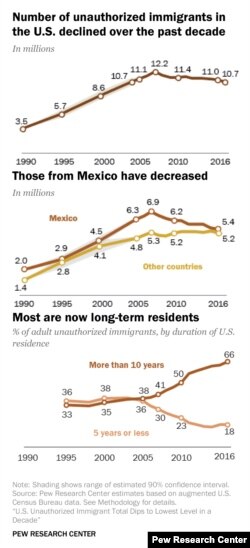The number of unauthorized immigrants in the U.S. fell to its lowest level in 10 years in 2016, the Pew Research Center reported Tuesday.
Using government data, nonpartisan Pew’s “Fact Tank” concluded that from 2007 to 2016, the number of undocumented immigrants in the U.S. fell from a peak of 12.2 million to 10.7 million.
Pew attributed the decrease to a sharp drop — by 1.5 million — in the number of Mexicans crossing the U.S. border illegally.
However, the number of immigrants from El Salvador, Guatemala and Honduras trying to cross over from Mexico illegally was up, making Central America the only region for which there was an increase in undocumented immigrants in the 10-year study period.
The number of undocumented Central Americans in the U.S. grew from 1.5 million in 2007 to 1.85 million in 2016.
Apprehensions of Central Americans at the U.S.-Mexico border have also risen, from 54,000 in 2007 to 165,000 in 2017. But Pew said they remained well below the peak of 239,000 in 2014.
Visa overstays
Because the numbers overall are dropping, the current population of unauthorized immigrants includes fewer recent arrivals than 10 years ago, especially from Mexico. The country still accounts for about half of the undocumented population in the U.S.
Here are some of the report's other findings:
— Two-thirds of adult unauthorized immigrants have lived in the country for more than 10 years.
— The number of unauthorized immigrant workers has fallen, along with their share of the total U.S. workforce from 2007 to 2016.
— As unauthorized immigrants extend their stays in the U.S., more have U.S.-born children — 43 percent in 2016, compared with 32 percent in 2007.
And while the U.S.-Mexico border has been the focus of the Trump administration and the media in recent weeks, Pew said most unauthorized immigrants enter the U.S. on legal visas and remain after their visas expire.
"The share who are likely to be people who overstayed their visas probably grew substantially between 2007 and 2016, to the point where they probably constituted most of the recent unauthorized immigrant arrivals in 2016," the report said.
The latest overstay report showed that more than 700,000 holders of expired visas should have left in fiscal 2017. Pew said 90 percent of overstays were from countries other than Mexico or Central America.
Deportations
Deportations, which peaked in 2013, could have played a role in decreasing the undocumented population.
Pew noted that deportations rose during the George W. Bush and Barack Obama administrations — from 211,000 in 2003 to a record 433,000 in 2013, according to Department of Homeland Security statistics.
In fiscal 2016, they remained above 300,000, most of them from Mexico and the three Northern Triangle nations in Central America.
“Deportations appear to have declined since then, based on limited statistics," the report said, citing a 17 percent drop from fiscal 2016 to fiscal 2017. “Nearly 230,000 unauthorized immigrants were removed, which included a decline in those detained at the U.S.-Mexico border, as well as an increase in those arrested in the interior of the U.S."





